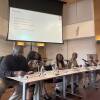The Lawyers’ Committee for Civil Rights and several student advocacy groups last week sued the Boston Public Schools and Superintendent Tommy Chang, to force them to disclose how a school police report ended up in the hands of Immigration and Customs Enforcement (ICE) via the Boston Regional Intelligence Center, known as BRIC.
Chang announced his resignation over the weekend and Mayor Marty Walsh, who has clashed with the superintendent over his supervision of the schools, did not specify if it was a result of lawsuit. The plaintiffs are asking a Superior Court judge to order the school department to release information consistent with Massachusetts public records law.
Matt Cregor, of the Lawyers Committee for Civil Rights, said the lawsuit was triggered by the detention and deportation in March of an undocumented East Boston student, who he said was falsely accused of being a member of the brutal MS-13 gang. The allegation was based in part on a school incident report submitted by a school police officer about a non-violent altercation, which Cregor said somehow made its way to BRIC.
“We have asked BPS through a public records request in December, and then the supervisor of records for the state did the same, to make clear how often this happens and what policies procedures or protocols BPS has to decide when how or if it shares this information," Cregor said.
The lawsuit charges that similar allegations have left innocent immigrant children “living in fear.” But in an interview with WGBH News, Chang said his directive to school officials was as clear as can be.
“We do not share information with law enforcement even when compelled by the courts. We will push back where we think we can,” Chang said.
Cregor said he doesn’t doubt Chang’s good intentions, but if the incident report written by the school police officer was in the possession of ICE during the East Boston student’s deportation proceedings, then Cregor said, “Either one of us is not telling the truth or we lack a common definition for what counts as student information. Either way that's a problem.”
Another plaintiff in the lawsuit, the Center for Law and Education, said information about students does not only come from school resource officers employed directly by the Boston Public Schools, but also from members of a division of the Boston Police who are stationed in schools.
Officer Bill Willis has been an officer for 31 years assigned to that school unit. When we talked, Willis was not allowed to disclose his unit’s relationship to the Boston Regional Intelligence Center. He said he is not out to tag any kid as a gang member, but that some kids tag themselves without realizing the consequences, including possible deportation.
“Some students may say that they're affiliated with a gang, but we don't specifically name students as gang members," Willis said. "If the student is going to identify himself or herself as being in a gang, then obviously there's some social issues going on there.”
At a City Council Public Safety and Criminal Justice Committee hearing last week, one man testified about the ease that the gang label can be attached to black and brown youth.
At that same meeting, an official with the Boston Regional Intelligence Center pushed back against the accusation that BRIC shares information of a non-criminal nature with ICE, including school incident reports citing gang membership. The Lawyers Committee for Civil Rights says only by providing all the information requested in the lawsuit will the public know for sure.





